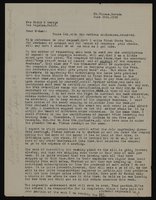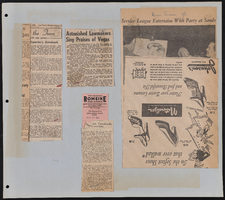Search the Special Collections and Archives Portal
Search Results

Correspondence, Levi Syphus to Sadie George
Date
Archival Collection
Description
Text
Hinds, James R.
James Roland Hinds, better known as Jim, was the Nellis Air Force base historian and a novelist in Las Vegas, Nevada. He was born in Okmulgee, Oklahoma on December 8, 1937. Shortly after his birth, his parents became civil service employees and moved the family to Washington, D.C., where James grew up. He recieved his bachelor's from Washington University in St. Louis, Missouri and his master's degree from Southern Illinois University in 1964. After that, he served in the United States Army for two years.
Person
Gragson, Oran K. (Oran Kenneth), 1911-2002
Politician Oran Kenneth Gragson was the longest serving mayor of Las Vegas, Nevada, a position he held from 1959 to 1975. He was born February 14, 1911, near Tucamari, New Mexico. In 1919, his family moved to Arkansas, then later to Texas. Gragson came to the Las Vegas area in 1932, and worked at the Hoover Dam for a short time before finding employment in highway construction. He managed the Boulder Inn Casino and Dance Hall for a brief time, and later opened the North Main Furniture Store, followed by the Charleston Appliance Center.
Person

Transcript of interview with Ruth Gust by Beth Ann Bonenfant, March 10, 1981
Date
Archival Collection
Description
On March 10, 1981, Rebecca (Beth) Bonenfant interviewed Ruth Gust (born 1905 in Mokane, Missouri) about her life in Nevada. Gust first talks about her original move to Las Vegas in 1947 and some of the first businesses that existed at the time. In this brief interview, she also talks about the first casinos, the culinary union, her employment as a server, and Mt. Charleston.
Text

Transcript of interview with Eugene Brandise by Mark Mangiaracina, March 3, 1980
Date
Archival Collection
Description
Text

Transcript of interview with Madeline Kadin by Kathy Mandel, March 8, 1975
Date
Archival Collection
Description
On March 8, 1975, Kathy Mandel interviewed housewife Madeline Kadin (born in New York) in her home in Las Vegas, Nevada. Also present for the interview is Madeline’s husband, who is referred to as “Mr. Kadin.” The three discuss differences between early Las Vegas and the present. The Kadins also explain the history of Helldorado and how it has changed over the years.
Text

Transcript of interview with Jack Cornell by Richard Fesler, February 18, 1979
Date
Archival Collection
Description
On February 18, 1979, Richard Fesler interviewed Jack W. Cornell (born 1918 in Manhattan, Nevada) about his experiences living in Nevada. The two first discuss historical buildings, including the Nye County Courthouse, and Cornell describes his family background and the different locations at which his ancestors lived. Cornell then talks about his experiences as an airplane mechanic for the Army Air Corps during World War II and the different countries he would visit during that time. The two also discuss the effects of the Depression, Cornell’s work in automotive body repair, and his recreational activities. Cornell also describes an experience in which he assisted an air escort for President Roosevelt, and he also describes when he witnessed one of the atomic tests. The interview concludes with Cornell’s thoughts on how the rural area in Manhattan has changed over time.
Text



